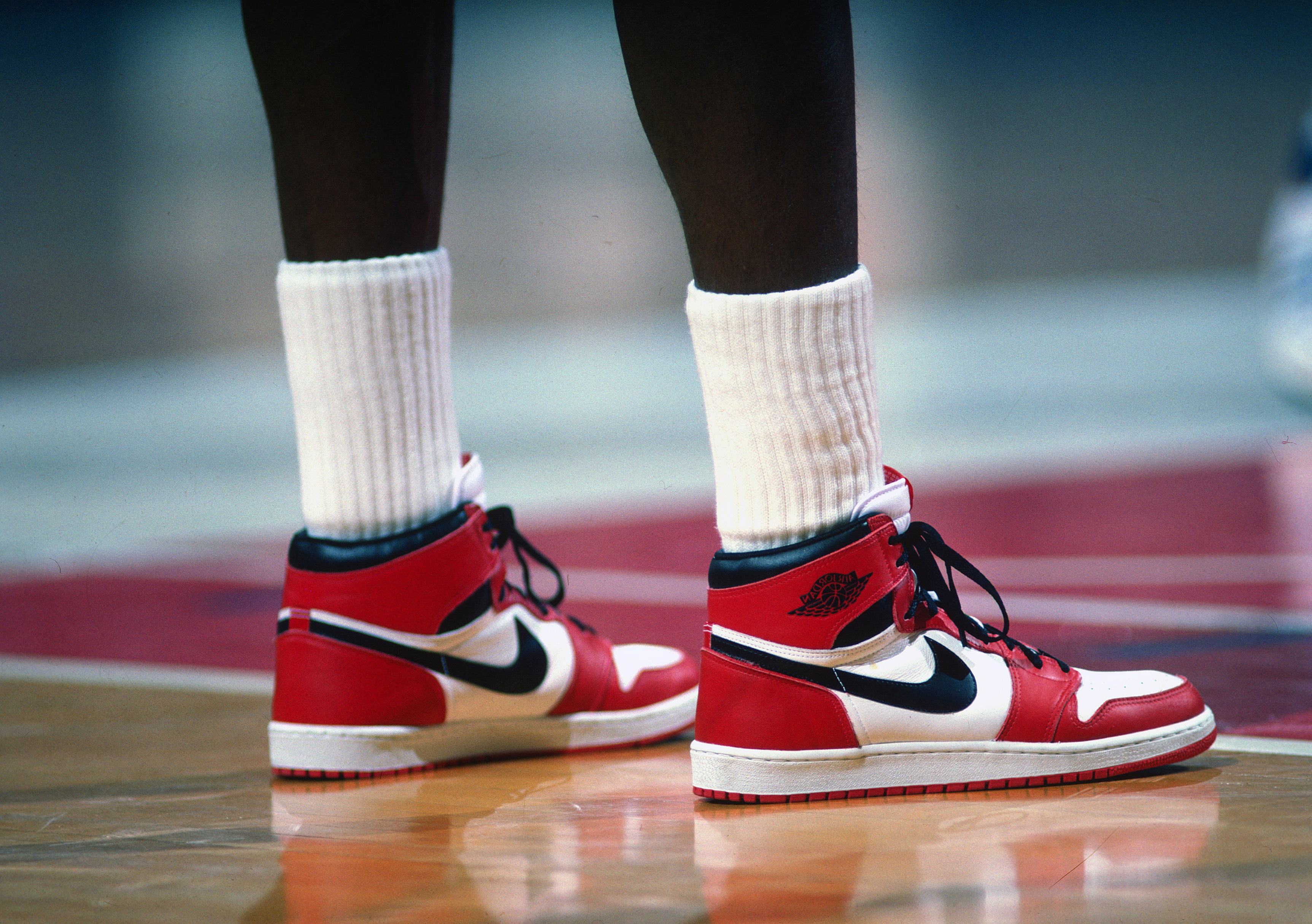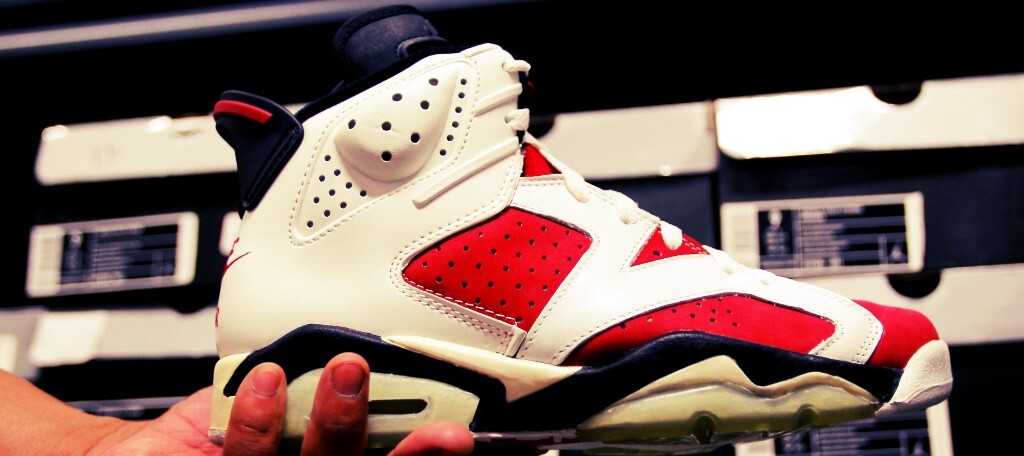The Last Dance spent plenty of time on Michael Jordan’s prowess as a basketball player, especially in relation to his final year with the Chicago Bulls, but it also dove into Jordan as a brand. During his heyday in the NBA, Jordan was perhaps the most popular human on earth, something that led to him becoming a model for basketball players who want to become pitchmen off the floor. For Jordan specifically, this paid off in the most unique of ways: his signature shoe from Nike turned into an iconic line of sneakers and, eventually, the business giant known as Jordan Brand.
These sneakers are at the heart of another documentary about Jordan, One Man and His Shoes. Created by English filmmaker Yemi Bamiro, the doc looks at Jordan Brand as a cultural phenomenon. This does not always paint Jordan in a positive light, as it occasionally dives into the darker side of the brand and how it has mastered drumming up demand to the point that sometimes guns are pulled and violence ensues over pairs of sneakers.
The documentary — which was originally slated to premiere at South by Southwest before the event was canceled due to the COVID-19 pandemic — debuts on Monday night at 8 p.m. EST on Vice. Prior to its release, Dime caught up with Bamiro to discuss One Man and His Shoes, the process behind making the doc, and the role sports plays in our society.
The timing of the doc was fascinating because of when it came out in relation of The Last Dance. Before we get into all that, what was the general idea you had behind making this documentary?
The entry point to me in relation to making this documentary was Air Jordan collectors. I was really interested in how obsessive these guys and girls were in relation to this one particular brand. So I started making that film, I started talking to Air Jordan collectors, filmed them, I was pretty sure that was gonna be the basis of this film. And something happened, I just realized I didn’t really understand how I could sustain a feature-length film just about collectors, and that became apparent pretty quickly. I think perhaps part of me was in denial, I didn’t want to accept that that was the case.
So I continued on with it for a year, but I always had this little thing in the back of my mind that I don’t know if this is going to sustain, and I think perhaps when you see one collector or two, you kind of get it, you get the gist, you get the fact that they are massively enthusiastic and passionate about what they do, but how does that transcend and how does that sort of sustain over a feature-length running time? So then I began to think about the phenomenon of the Air Jordans, I began to think about how this all happened, all the stuff that predates the collectors, and that was a collaboration with Michael Jordan and this idea of genius marketing and this guy being incredible at his job, and then just timing, how everything aligned at times, let the door open for this all to happen.
And that’s pretty much the film we ended up making, the story of the Air Jordan sneaker told by the men and women who were at the forefront of the phenomenon, whether that be Peter Moore, the designer of the first Air Jordan and the Air Jordan 2, whether that be Sonny Vaccaro, whether that be David Falk, whether that be whoever, Rob Strasser and Julie Strasser. All of those people were instrumental in us having this phenomenon, and I was interested in exploring that.
Based on what you laid out, and correct me if I’m wrong, this was a bit of an entry point into sneaker culture for you and you’re not someone who has been collecting over years?
No, I’ve always liked sneakers, I’ve always like trainers, but I would never call myself … I would buy them and talk to people I would know, they’d probably tell you I’ve got too many pairs, but I would never cast myself as a collector. I’m not comparable to any of the people in the film who collect, whether that be Air Ruddy, the guy in France, or Yumi, the girl in Japan, or even Jumpman in Detroit. I have an appreciation of sneaker culture, but I’d never say I was a part of it. I would just casually buy — maybe a bit more than casually — I would just buy sneakers, and that would be quite often. But I’m not a collector, no.
One thing I liked about this doc was how it spent a ton of time on the rise of Jordans and Jordan culture before getting into the darker underbelly of that. Why did you find giving that context important instead of just diving into some of the less great aspects of the culture around Jordans?
I wanted to make this film because I’m a fan of Air Jordan sneakers, I’m a fan of the phenomenon. I just wanted to explore it in as much depth and with as much integrity as I possibly could. So I think I just wanted to sort of approach it from the perspective of a blow-by-blow account. I never wanted to be sensationalist about it, I didn’t want to be hysterical about it, I just wanted to have a sense of journalistic integrity in the way we told the story, and my understanding of this phenomenon which became what it was and became so big, in cities around America, these shoes were so revered that people would pull out guns for it. But I didn’t want that to be how we start the film, because there is so much more context. We have to get to the point where the audience understands why people are pulling guns out on one another, because of this phenomenon.
And ultimately, that’s what I was interested in. I was interested in telling the story of the sneaker, warts and all. I didn’t want to omit anything, I didn’t want to rewrite history, I just wanted to tell it how it is. People remember those Sports Illustrated issues, people remember those stories of people getting robbed on the train, and that stuff hasn’t stopped happening. People still go and meet each other, having spoken on eBay and agreed on a deal, and violence ensues. It’s just part of the sneaker’s unfortunate history. But in saying that, it’s not the be all and end all of the sneaker’s history. So I think I just wanted to be completely fair and balanced and just tell the story from the perspective that I told it.
I loved the quote “Sport is a microcosm of society,” then it gets into things like Colin Kaepernick’s protests and the death of Len Bias. What do you believe this doc says about sport and the role it plays in our society?
That’s a really good question. I think it’s a business, isn’t it? Ultimately, I think it’s a business. If we’re talking about this film and we’re talking about sport as a whole, I think it’s a business. It has many roles it plays — entertains people, it makes people happy, it brings people joy, allows people to switch off. But ultimately, the foundation, it’s a business. Lots of broadcasters around the world are not in trouble, but there’s a sense of trepidation because we haven’t had any sport for two months, and this obviously has financial implications and implications on everything.
So I think ultimately, it’s a business, and I think hopefully, this film provides context to how it is a business and how it sort of works.
Was there a moment, if you could identify one, where Jordans went from these cool sneakers to this gigantic phenomenon that everyone is fanatical about, for better or worse?
So David Falk, who was Michael Jordan’s former agent, he was obviously quite instrumental in sealing the deal between MJ and Nike — he had a really good relationship with Rob Strasser, who is no longer with us. But I think Nike’s expectation of what the first Air Jordan would do from a business perspective, and then what it went on to do, that always blew my mind, the numbers that first Air Jordan did. And this was in 1985, where it was still the most expensive basketball sneaker that had hit the market, it’s not like now where we’re accustomed to sneakers as a high-end product. It’s not like now where people will wear a three-piece suit or tuxedo with trainers, we’re talking about 1985 where this is very much a rarity.
That will always fascinate me and always blow my mind in the way that Nike had sort of humble and, pretty frankly, low expectations of what the first Air Jordan would do, and then what it went onto do is obviously a phenomenon. It’s the stuff of folklore.
There’s one person in here specifically I want to ask about and that’s the Jordan collector in Detroit. Did you get any sort of estimate on how much money he’s spent on everything — the just under 1,200 shoes, the memorabilia, all of that?

I couldn’t tell you. I don’t even think he knows, and that’s me being honest. I’m pretty sure I have asked him, the guy is called Jumpman, and over the years I’ve filmed him. So the first time I filmed him was in one house, and the second time I went back, he lives in a bigger house because over the years, he collected more shoes and needed more space. He’s got Gatorade bottles that are like 30 years old and he’s got Wheaties boxes that he’s never opened, he’s got people from Japan that would pay top dollar for that stuff and he would never sell it. It’s gotta be worth millions and millions in terms of everything that he has, because some of that stuff is completely priceless and you’re never gonna get it again. He’s been doing this for 30 odd years, this is not a fanboy, he’s committed, he’s a passionate, enthusiastic collector. It’s next level, I’ve never seen anything like it in my life.
What do you hope people take away from this doc?
I just hope that people appreciate the marketing genius of Nike, obviously the incredible athleticism of Jordan. And just also, the dynamics and the power of business and marketing and how that all forged together to tell this perfect fairytale of Michael Jordan. I just hope people understand it all started with this. Everything we have today in terms of endorsement deals and companies having a figurehead, it all started with Michael Jordan and Nike and I hope people understand that from a business perspective. And then also, with the sneaker’s unfortunate history, it’s still happens in our society today. It’s still very much a part of it, and I think it’s interesting to understand and to take that stuff away.
My last question, I’d be remiss if I ask if you got a chance to watch The Last Dance and get your thoughts on that.
You know what? I’ll be completely honest, I haven’t seen a single frame of The Last Dance, and I think part of the reason is I’ve been really busy with this film, it’s been quite a crazy six weeks in terms of the cancelation of South by, and then everything else that has happened. But I’m really looking forward to getting into it, all my friends on WhatsApp groups keep sharing stuff with me and telling me how great it is. But yeah, I just want a little space from this project so that I can really jump in and enjoy it.







